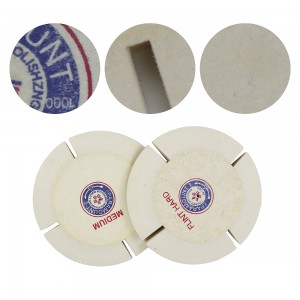In the production of food processing equipment, wool felt wheels play an important role in surface finishing. Stainless steel is widely used in food – grade machinery due to its durability and hygiene properties. Wool felt wheels are employed to polish the surfaces of stainless steel components, ensuring a smooth and seamless finish. This not only improves the appearance of the equipment but also reduces the risk of food particles getting trapped in crevices, making it easier to clean and maintain hygiene standards. A major food processing plant stated that by using wool felt wheels for polishing their equipment, they were able to cut down on cleaning time by 25%, while also enhancing the overall quality of their production line.
For the beverage industry, especially in the production of glass bottles and jars, wool felt wheels are used for deburring and edge – smoothing. After the glass is molded or cut, the edges can be sharp, which poses a risk during the filling and packaging process. Wool felt wheels gently polish the edges, rounding them off without causing any damage to the glass. This not only ensures the safety of workers handling the bottles but also improves the aesthetic appeal of the final product. In addition, for the internal surfaces of some beverage containers, wool felt wheels can be used to apply special coatings evenly, enhancing the shelf – life of the products by preventing oxidation and contamination.
The use of wool felt wheels in the food and beverage industry also extends to the maintenance of conveyor belts and other moving parts. These parts are often subject to friction and wear, which can affect the efficiency of the production line. Wool felt wheels, with their soft and absorbent properties, can be used to apply lubricants evenly, reducing friction and extending the lifespan of the equipment. This helps to minimize production interruptions and maintain a smooth operation.
Despite the benefits, the adoption of wool felt wheels in the food and beverage industry is not without its challenges. Strict hygiene regulations require that all materials and tools used in production meet high – level safety standards. Manufacturers of wool felt wheels need to ensure that their products are made from food – grade materials and do not pose any risk of contamination. Regular testing and certification are necessary to gain the trust of food and beverage companies.
As the food and beverage industry continues to strive for higher quality, efficiency, and safety, the role of wool felt wheels is likely to expand. With continuous innovation and improvement to meet the specific requirements of this industry, wool felt wheels are set to become an increasingly important part of the food and beverage production process.
Post time: Jun-05-2025

